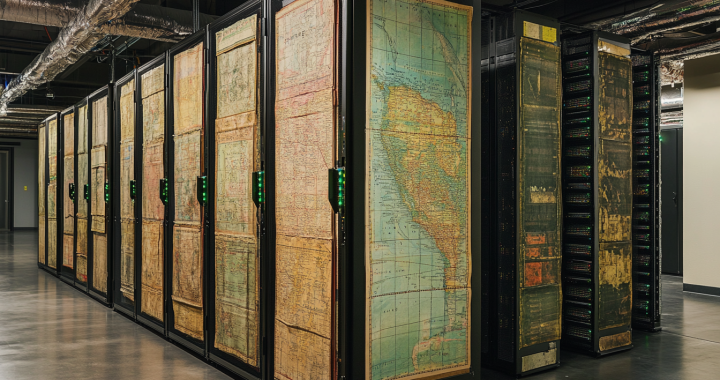What Is Enterprise IT Intelligence?
I have heard the phrase “Enterprise IT Intelligence” banded around a few times recently, in particular when talking about concepts like Agile, DevOps at scale or IT Environment Management.
It's quite a fancy set of words. However, what does it mean, though?
Is it an oxymoron? Is it simply someone trying to create a new job title for themselves?
> "Ahem, yes. I have decided I am an enterprise intelligence analyst."
To be honest.
I'm already suspicious of anyone who calls themselves "data scientist" , and I'm all the more so when it comes to the title above.
To put it in "Up Goer Five" terms (read: using only the 10,000 words people use most often), enterprise IT intelligence is the idea that seeing and learning things across an entire work place can help people in power do new and good things.
This usually in turns leads to more value, better revenue, happier employees, or whatever else that decision-maker is targeting. And of course, we threw in the term "IT" because most of this data comes from employee and customer interaction with software applications.
Data vs. Information vs. Intelligence
Software applications are the main producers of this potential intelligence. But let's be clear: they usually only produce information and data, not actual intelligence. This is why enterprise IT intelligence gets its own moniker. It's not common. The way we spin up application teams isn't geared towards producing intelligence.
So, what's the difference between data, information, and intelligence? They're easy to mix up, and confusing them can lead to a lot of money spent collecting these three things with little gain.
Data means facts. If we're talking about human beings, we can consider our height, weight, and age to be data. Information means we're using snapshots of these facts to answer simple questions. In our example, that means taking our data to project what our current risk of a heart attack is. Intelligence, the glorious topic of this post, is the story that this information tells. "Why do people with a high risk of heart attack love popcorn?" Intelligence often leads to decisions like, "Let's partner our movie theaters with the American Red Cross. We'll offer a discount on our weekend showings if they do a health evaluation."
User-Focus Doesn't Always Lead to Intelligence
As I said, most applications produce data and information, not intelligence. Why is this?
Well, it's because applications in an enterprise are usually either user-centric or data-centric. A data-centric application may be something like a service that stores recommendations for loans to which people may apply. User-centric applications might be something like a tool to help mortgage lenders approve a new mortgage. In organizationally-challenged enterprises, a team may be defined as the database management part of seven teams that help mortgage lenders approve a new mortgage.
It's healthy to focus on the main users of your application, and it will lead to much success for you and them. But what the user does or needs in order to interact with you is just a small part of the story. Think about a mortgage enterprise. A user applying for and receiving a loan are just two steps of the overall value. The loan has to be underwritten, someone has to check if there's money in the bank for the loan, and the risk of the loan must be audited. I'm not a mortgage banker, so there are probably dozens of steps I'm missing. No one user-focused application team can handle all of this at any decent-sized company.
Value Streaming
Instead, intelligence has to be focused on the value stream of the enterprise. This is a fancy way of saying we should focus on how the company goes from wanting to fulfill a customer desire to creating a fully formed application: how things go from a twinkle in the eye to reality. So if I'm an automotive company, I'll map all the steps of a new car design being turned into a car that the customer drives off the lot.
Since I can see the entire stream, like water, I can shift it. I can put a metaphorical rock in the right place to steer the stream where it needs to go. No one user-centric or data-centric application can do this on their own, but they all have a little bit of data and information they can give to the effort, creating intelligence.
What Is Its Power?
Gaining actual intelligence over multiple aspects of your enterprise is powerful. I mean, this is the stuff that drives companies to the top—and the lack thereof can drive a company out of business. Netflix has spun up entire genres of original content based upon the intelligence they gathered about what people like to watch. Amazon uses intelligence to groom their product recommendation engine to outsell their competition. Until you use intelligence across your enterprise, you're only seeing a small part of the story.
Bad analogy time: think about a musical composition. You have notes, the beat, the scale and the volume. This your data. You have the transitions between notes: sometimes you go up smoothly, sometimes you go down in staccato fashion, sometimes you pause. This is your information. Then you bring in the instruments. You have your strings, brass, and percussion. There may also be singers. You bring in a group of altos, tenors, and basses (sorry, sopranos). They each get their own set of notes. These groups are your applications.
However, the true beauty of the music cannot be understood until you hear all of it come together. You can get an idea of how the song may sound with just one section, but you won't truly appreciate it until everyone works together. That is intelligence. And the conductor takes these elements and guides them, raising or lowering the volume, slowing down a section or speeding them up. This is why intelligence is valuable. And only the conductor, the one who has this intelligence at their disposal, can do it.
Where To Go From Here
So let's make some beautiful music. We live in a great age where there are many, many tools that can help you gather intelligence for your enterprise. In fact, there are enough tools that it may overwhelm you if you're dipping into the space for the first time. It may be helpful for you to look into tools that simplify the process.
I hope this helped clear up the nature of the intelligence behind "enterprise IT intelligence."
Author Mark Henke
Mark has spent over 10 years architecting systems that talk to other systems, doing DevOps before it was cool, and matching software to its business function. Every developer is a leader of something on their team, and he wants to help them see that.



